Material issues are identified each year which could significantly impact positively or negatively on the group’s ability to create and sustain value for stakeholders. Each year the board and management review these issues by taking into account the group’s business plans, budgets and strategy, risks, sector and competitor dynamics, the trading environment, macroeconomic factors, the capitals of value creation, and the legislative and regulatory environment.
The needs, expectations and concerns of stakeholder groups that are most likely to influence the group’s ability to create sustainable value, notably customers, suppliers, regulators, staff, shareholders and providers of financial capital are central to determining these material issues.
RISKS AND IMPACTS are outlined for each material issue to highlight the downside factors that need to be managed.
OPPORTUNITIES are identified to show how each material issue can be addressed to not only manage and mitigate the risk but also to capitalise on opportunities to create value.
Read more about the needs, expectations and concerns of our stakeholder groups.
Material issues for the year ahead
Why material?
South African consumers remain under financial pressure due to elevated food, utility, transport and lending costs, together with high unemployment, which continues to constrain spending power and directly impact retailers’ revenue and margins.
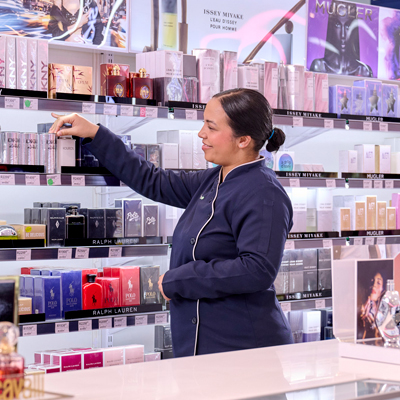
Risks and impacts
- Ongoing economic pressure may reduce consumer purchasing power, resulting in lower discretionary spend and increased price sensitivity.
- The depreciation in the value of the Rand can increase the cost of imports which may not always be passed on to customers, impacting profitability and financial performance.
- Global inflation has a significant impact on South African consumers, contributing to higher fuel prices and broader cost-of-living pressures.
- Criminal activity, including syndicated crime, escalates during times of economic hardship. In particular, crime syndicates targeting high-value, in-demand or scarce lines can lead to stock loss, inability to service clients, loss of revenue, damage to assets and business interruption.
Opportunities
- Clicks will continue to pursue a strategy of price competitiveness, drive sales volume growth and entrench the brand as a value retailer.
- Leverage key market differentiators, including an extensive and convenient store and pharmacy network, private label and exclusive ranges, personalised engagement through the Clicks ClubCard and consistently high standards of customer care.
- UPD will continue to enhance operational efficiencies
to off-set pressures from higher sales of generic medicines and increased fuel prices, while evaluating complementary product offerings to support business growth.- Rand hedging of high-value imports to mitigate currency volatility and advancing a supplier development programme to secure alternative local sources of supply.
- Strengthen crime detection and prevention measures, including criminal background checks on new employees, tip-off lines, undercover agents and visible consequences for fraud and theft.
Why material?
A modern, responsive, stable and efficient IT infrastructure is critical to support the group’s growth objectives and meeting evolving customer and market demands, while ensuring the security and confidentiality of data.

Risks and impacts
- Failure to enhance and maintain IT infrastructure and capabilities may result in operational inefficiencies, supply chain disruptions, loss of competitiveness, compromised business continuity, and an inability to meet evolving customer and market demands.
- Outdated systems increase exposure to cyberthreats and information security breaches, raising the risk that confidential customer data or sensitive internal information may be accessed and compromised.
- Limited capacity to adopt new technologies or implement system enhancements could constrain the group’s ability to support new business initiatives and respond effectively to changing customer expectations.
- Delays or technical challenges in delivering critical IT projects required for business transformation and strategic growth may adversely impact operations and hinder the achievement of long-term objectives.
Opportunities
- Expand investment in cyber resilience through advanced threat detection and data loss prevention tools, regular penetration testing and continuous employee cyber awareness training.
- Strengthen Retail IT by focusing on enterprise architecture to support expansion and digital innovation, enhancing data management and analytics to deliver personalised customer experiences and real-time decision-making, and improving system integration across channels.
- Pursue additional opportunities including increasing redundancy to mitigate network failures, outsourcing selected IT solutions, and further investing in skills and capacity development.
Why material?
Clicks faces competition on several fronts, including national food retailers and general merchandise chains, online retailers and other pharmacy businesses. Continued growth and shareholder return requires successful competition for existing market share and expansion into new segments and markets.
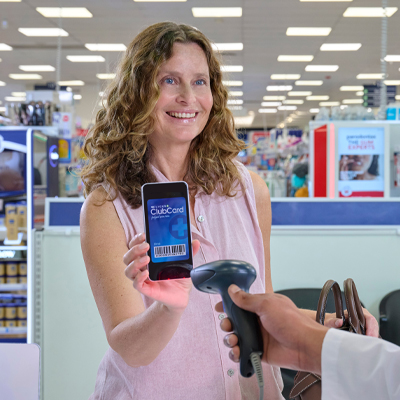
Risks and impacts
- Aggressive competition could result in loss of market share, the inability to maintain market position and ultimately threaten the growth and profitability of the business. In particular, the group faces competition risk from the expansion of retail chains into healthcare and medicines, and from online retailers with their fast home delivery models.
- Ongoing or new aggressive competition in the third-party distribution sector could result in the loss of and inability to recover market share and the inability to maintain market position, threatening sustainable growth and profitability.
- Increasing price competitiveness and promotional activity of retailers, including competing loyalty schemes, could negatively affect sales and margins in Clicks.
Opportunities
- Clicks continues to capitalise on its key competitive differentiators: an extensive physical footprint with aggressive expansion plans, extending the pharmacy network and opening dispensaries where possible in South African stores, expanding the baby store-in-store offering and enhancing the online sales infrastructure.
- Build brand loyalty through ongoing recruitment of new members to the Clicks ClubCard and the Clicks mobile app.
- Implement measures to increase pharmacy customer convenience through the rollout of alternative delivery models, including smart lockers.
- Optimise service and cost in UPD to remain competitive while focusing on profitable client segments.
Why material?
Clicks Group requires consistent compliance with numerous regulations and legislation. Healthcare markets are highly regulated across the world and approximately 50% of the group’s turnover is in regulated pharmaceutical products.
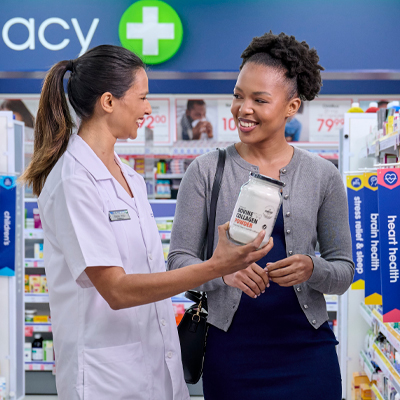
Risk and impacts
- Non-compliance with current and emerging legislation could result in regulatory sanctions, including fines, loss of licences or store closures, reputational damage as well as increased compliance requirements and costs.
- The ability to achieve growth targets, expand markets and capitalise on revenue opportunities could be constrained by challenges in securing suitable retail space and the necessary pharmacy licences. The ability to introduce private label and exclusive scheduled and complementary medicines could also be hampered.
- Changes in healthcare legislation and regulation could impact on Clicks’ and UPD’s turnover and margins. In particular, the introduction of National Health Insurance (NHI) and its potential impact on both private and public healthcare markets remains uncertain and could significantly influence the business and operating model.
Opportunities
- The group’s robust governance framework ensures compliance with regulations through ongoing monitoring, self-audits and an in-house information officer.
- Management continues to engage proactively with regulatory authorities on legislation and regulation to accelerate the granting of pharmacy licences and approval of generic medicines to broaden access to affordable healthcare.
- Clicks and UPD are well positioned to capitalise on market consolidation resulting from changes in legislation and regulation.
- The group continues to partner with government to be a preferred service provider where opportunities arise.
Why material?
A consistent, stable and predictable supply chain is required for serving customers and generating revenue.
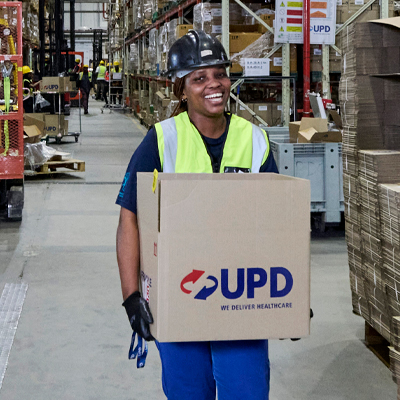
Risk and impacts
- Disruptions arising from geopolitical trade tensions, global or vendor supply chain constraints or internal operational inefficiencies may result in stock unavailability, negatively impacting customer order fulfilment and overall supply chain performance.
- Disruptions at warehouses or distribution centres could impede the flow of stock to stores, hospitals and customers, leading to lost revenue.
- Inability to service customers effectively may result in lost business, as customers source their medicine needs elsewhere.
- Poor stock availability or service in stores and online could lead to lost sales opportunities and reputational damage.
- Inaccurate forecasting of peak inventory requirements may lead to lost sales and customer dissatisfaction.
Opportunities
- Measures to enhance security and operational efficiency of distribution centres are continuously being implemented.
- Alternative suppliers are being identified for key products and more products are being sourced locally where possible.
- Private label sourcing is being accelerated, and local sourcing is prioritised to manage costs and mitigate against supply chain disruptions.
- Stock levels are actively managed to balance operational costs with customer demand.
- Active measures are in place to monitor and manage risk, and anticipate potential global and local supply chain disruptions.
- The group’s business continuity plan includes strategies to mitigate the impact of supply chain disruptions.
Why material?
The group is impacted by events in the environment and needs to actively minimise negative impacts on the environment to ensure long-term sustainability.
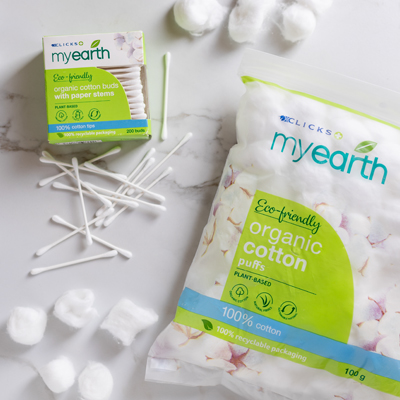
Risks and impacts
- Extreme weather events and changing climate patterns may disrupt operations, trading and supply chains, damage physical assets and lead to increased costs.
- Adverse weather conditions could interrupt trading in affected locations, while shifts in weather patterns may affect the timing and mix of seasonal product sales, resulting in revenue loss.
- Sustained periods of extreme high temperatures could affect the delivery and storage of key medicines.
- Inability to meet customer demand for environmentally friendly product alternatives could result in lost revenue.
- Failure to measure and meet environmental impact targets may increase pressure from investors and stakeholders to comply with environmental guidelines.
Opportunities
- Business continuity and response plans are regularly updated to address potential disruptions, including extreme weather events.
- Supplier arrangements are in place to ensure adequate buffer stock levels and faster turnaround times.
- Measures to reduce the group’s carbon footprint are in place, with longer-term plans being developed to achieve carbon neutrality.
- Packaging and waste reduction efforts are being advanced, particularly in private label products and through the use of durable, recyclable bags in stores instead of plastic.
- Electric vehicles and charging stations are being deployed to reduce carbon emissions while driving efficiencies in UPD.
- Solar energy solutions have been installed at all owned distribution centres and the head office, with battery storage implemented at two distribution centres and the head office.
- The group aligns with both local (JSE Sustainable Disclosure Guidance) and international reporting frameworks on climate change.
